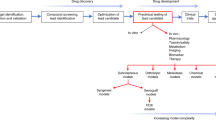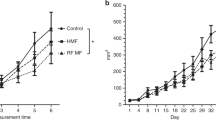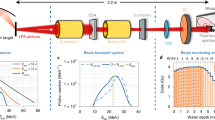Abstract
IN 1932 it was observed by Geoffrey Keynes1, working on the disappearance of human mammary carcinoma by surrounding the growth with radium needles, that on cutting out a piece of the tumour after the needles had been in place for ten days, some of the malignant cells were alive and became grafted in the overlying biopsy skin-incision, although the rest of the tumour from which the piece had been removed eventually disappeared. This suggests that the surrounding normal cells might have been acted on by the radiations so as to continue to pour out a chemical substance which led to the death of the cancer cells2.
This is a preview of subscription content, access via your institution
Access options
Subscribe to this journal
Receive 51 print issues and online access
$199.00 per year
only $3.90 per issue
Buy this article
- Purchase on Springer Link
- Instant access to full article PDF
Prices may be subject to local taxes which are calculated during checkout
Similar content being viewed by others
References
Keynes, Geoffrey, Brit. J. Surg., 19 415 (1932).
Pannett, C. A., Lancet, 829–830 (April 20, 1957).
Kuzin, A. M., Radiobiology Symposium, Moscow, Oct. 18–20, 1960, reported in The New Scientist, p. 1200 (Nov. 3, 1960).
Author information
Authors and Affiliations
Rights and permissions
About this article
Cite this article
COMPTON, A., PANNETT, C. Effect of Irradiated Normal Tissues on the Growth of Mouse Carcinoma. Nature 191, 1101–1102 (1961). https://doi.org/10.1038/1911101a0
Issue Date:
DOI: https://doi.org/10.1038/1911101a0
This article is cited by
Comments
By submitting a comment you agree to abide by our Terms and Community Guidelines. If you find something abusive or that does not comply with our terms or guidelines please flag it as inappropriate.



